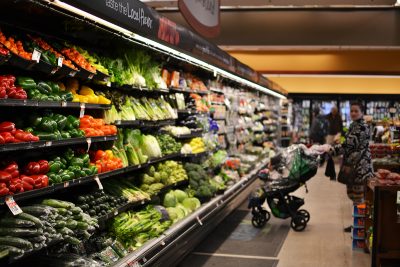
The Greater Boston Food Bank announced its partnership with Charles River Community Health on Tuesday to launch their new “Mobile Markets,” which will provide fresh produce to CRCH patients on the third Tuesday of each month.
The food bank will host Mobile Markets at 13 sites across Massachusetts, including a location in the parking lot of CRCH’s Joseph M. Smith Building, where the two organizations will distribute a share of produce to each household in attendance, including about 30 pounds of produce to each volunteer, according to the launch’s Facebook page.
Stephanie Nichols, a communications consultant for the GBFB, said the organization wanted to partner with CRCH because community members of health centers like CRCH reported they did not have enough access to healthy foods, resulting in food insecurity.
“It was an opportunity for us to help meet a need and an opportunity for Charles River to have that need met,” she said.
On average, the Mobile Markets will serve about 100 households per month, Nichols said, giving the market a potential reach of 345 total family members every month.
While there is no income requirement to be a market customer, newcomers must fill out a two-question survey called “the hunger vitals survey,” Nichols said. The first question is if, within the past year, they were worried their food would run out before they could get money to buy more. The second question is if their food ran out at any point last year before they had more money.
Susan Lowcock, director of development and community relations at CRCH, said 84 percent of patients at the CRCH have an income that falls 200 percent below the federal poverty level, and 91 percent of them reported food insecurity.
Patients who come to the Mobile Markets in the afternoon can choose to buy whatever produce they like, Lowcock said.
“We let Greater Boston Food Bank know the number of people we will serve and number of types of fruits and vegetables we can accommodate based on available space,” says Lowcock. “GBFB sends their trucks to us on the designated day, and we gather staff and volunteers to help set up the market and pre-bag the produce for our customers.”
New market customers can register to get a market card, Lowcock said, and repeat customers can receive a hand stamp to acknowledge that they have a market card.
Several Boston residents praised the initiative as a way to improve patients’ health and quality of life.
Felix Ramirez, 24, of Dorchester, said the Mobile Markets will allow patients to obtain more fresh produce and improve their health.
“Affordability is a huge reason people resort to fast food and less healthy alternatives,” Ramirez said. “Fresh fruits and veggies can get expensive. Better accessibility will make people more willing to be healthy.”
Ramirez said the Mobile Markets will help patients begin a sustainable healthy lifestyle.
“Promoting a healthy lifestyle is a huge benefit to a community overall,” says Ramirez. “It should be up to the communities to support healthy lifestyles rather than the government, and this Mobile Market will give people the opportunity to take initiative.”
Emily Feltault, 22, of Fenway, said the initiative is great way to give people in lower socioeconomic groups access to higher quality food.
“The demand for fresh fruits and vegetables is a constant issue,” Feltault said. “Produce is a crucial part of a healthy diet, but it’s usually the first thing to go. The Mobile Market allows them to get what they need without breaking the bank.”
Emanuel Villalobos, 35, of Jamaica Plain, said government agencies should offer greater support to local agricultural organizations.
“The government isn’t really developing [the] local agriculture economy,” Villalobos said. “I work in a restaurant, and people are paying more now for produce that is organic and fresh. That makes it more expensive in the market.”
Villalobos said the current food system unfairly discriminates against people in lower income brackets.
“We have the assets to create better systems for people from different economic backgrounds,” Villalobos said. “Food should be for everybody, not just those who can afford it.”






















































































































